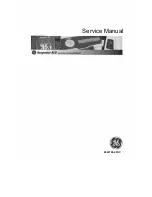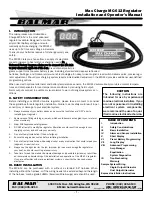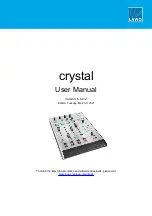
Shake ‘n Stack 1-1
Thermo Scientific
Oven Temperature
Monitoring
Section 1
Introduction
The Thermo system of Hybridising in bottles is considered by many
molecular biologists to be the best method for conducting Hybridisations
with Southern, Northern, Dot, Slot or Colony Blots. Additional
information, including detailed protocols, is contained in the included
Hybridisation Guide.
Hybridising in bottles means that probe volumes may be significantly
reduced compared to experiments performed in conventional systems, and
the continual movement of the probe across the surface of the membrane
results in very efficient hybridisation reactions.
Protection from exposure to radiation is provided by the heavy walled
borosilicate glass bottles.
Warning
Based on tests, these bottles block almost 100% of BETA
radiation emissions of a 1,000 pCi P-32 source. However, users should
observe precautions due to induced X-ray phenomenon (Breemsstrahlung)
occurring, depending on the type(s) of radionuclides used.
s
The Hybridisation Oven itself provides additional shielding. In the event
of a spillage within the Oven, the stainless steel drip tray will contain up to
6.8 fl. oz. (200 ml) of liquid.
Note
If the Shake ‘n Stack is not used as specified in this manual, the
protection provided by the equipment may be impaired.
All Ovens are calibrated by matching the thermistor temperature read-out,
seen on the LCD display, to the actual measurement of distilled water
contained within a Hybridisation Bottle as it rotates. The temperature
measuring device used inside the calibration bottle is traceable to national
standards.
This calibration method ensures all experiments using the rotisserie meet
our temperature accuracy specification of ±1°C and indeed, due to the
rotisserie action, uniformity within the bottle is ±0.25°C. However, it is
important to note that the temperature inside the oven chamber will vary
from point to point and therefore, the temperature of objects/vessels,
which are not placed in the rotisserie, will vary from that which is
displayed. Refer to “Setting the Required Temperature” for
recommendations on temperature setting when using shaking platforms.
Summary of Contents for Shake 'n Stack 6244
Page 13: ...2 4 Shake n Stack Thermo Scientific Section 2 Unpacking and Installation...
Page 21: ...4 6 Shake n Stack Thermo Scientific Section 4 Methodology of Hybridisation...
Page 27: ...7 2 Shake n Stack Thermo Scientific Section 7 Use of Radioactive Probes...
Page 31: ...8 4 Shake n Stack Thermo Scientific Section 8 Technical Specifications...
Page 32: ...Shake n Stack 8 5 Thermo Scientific Section 8 Technical Specifications...
Page 33: ...8 6 Shake n Stack Thermo Scientific Section 8 Technical Specifications...
Page 34: ...Shake n Stack 8 7 Thermo Scientific Section 8 Technical Specifications...
Page 35: ...8 8 Shake n Stack Thermo Scientific Section 8 Technical Specifications...
Page 36: ...Shake n Stack 8 9 Thermo Scientific Section 8 Technical Specifications...
Page 37: ...8 10 Shake n Stack Thermo Scientific Section 8 Technical Specifications...
Page 38: ...Shake n Stack 9 1 Thermo Scientific Section 9 Electrical Schematics...
Page 39: ...9 2 Shake n Stack Thermo Scientific Section 9 Electrical Schematics...
Page 40: ...Shake n Stack 9 3 Thermo Scientific Section 9 Electrical Schematics...
Page 41: ...9 4 Shake n Stack Thermo Scientific Section 9 Electrical Schematics...
Page 42: ......
Page 50: ...A 8 Shake n Stack Thermo Scientific...
Page 51: ...HYBRIDISATION GUIDE USER INSTRUCTION MANUAL Manual 7222060 Rev 0...
Page 91: ......









































